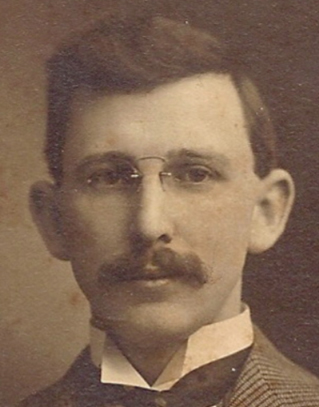
Rodolph Duffy, a prominent attorney from Jacksonville, is listed in one of the school’s summer catalogs as serving on the board in 1922 but as Mary Jo Bratton notes, his name does not appear in the minutes of the board meetings during the 1921-1922 academic year. Bratton otherwise states that Duffy was a board member during the 1921-1922 year, coinciding with the beginning of East Carolina’s standing as a teacher’s college authorized to grant bachelor’s degrees to those completing its four-year program. Biographical sketches note that Duffy struggled throughout much of his life with poor health, making it possible that his brief service as a board member coincided with a physical decline that led, in 1924, to his passing.
A native of rural Onslow County, Duffy was educated at high schools in Wilson and Kinston before completing a bachelor’s degree at Davidson College. In 1881, he earned a law license and soon established a successful practice in Jacksonville. Politically active, Duffy was known as an eloquent spokesperson for the Democratic Party. He was elected to the state legislature for successive terms (1894, 1896) before being elected solicitor for the third judicial district in 1898, an office he held for three terms.
In 1894, Duffy gained high political fame within eastern North Carolina’s Democratic ranks for his blistering attacks on Fusionists and their so-called political tactics. A contemporary of the Democratic party’s gubernatorial candidate in 1900, Charles B. Aycock (1859-1912), Duffy no doubt supported his party’s white supremacist platform and the 1900 suffrage amendment to the North Carolina constitution that resulted in the effective disenfranchisement of the vast majority of African American male voters.
In 1910, he ran for the Democratic nomination for Congress, but lost to John M. Faison of Duplin County; the same year, Duffy retired from politics and thereafter spent the remainder of his life working as an attorney and tending to his family’s farms in Onslow County.
Sources:
- “16 Democratic Solicitors: Hon. Rodolph Duffy, Nominee for Solicitor of the Third District.” News and Observer. September 21, 1902. P. 4.
- Arendell, F. B. “Democracy’s Defenders, Who Fought a Sixty Day’s Battle in the Interest of Good Government.” North Carolinian. March 18, 1897. Pp. 1, 2.
- “Board of Trustees.” East Carolina Teachers College Summer Term, June 13-August 15, 1922. Raleigh: Edwards and Broughton Printing Company, 1922.
- Bratton, Mary Jo. East Carolina University: The Formative Years, 1907-1982. Greenville, N.C.: East Carolina University Alumnae Association, 1986.
- “Democratic Public Speaking.” News and Observer. September 28, 1898. P. 4.
- “Duffy at Chinquapin: Large Crowds and a Great Democratic Rally.” News and Observer. October 18, 1908. P. 4.
- “Empty Seats Are Remindful Going Three Great Men: Gathering of Lawyers at Jacksonville Does Honor to Memory Onslow’s Late Dead.” New Bernian. October 9, 1924. P. 4.
- “Laud Career of Rodolph Duffy: Attorneys at Jacksonville Pay Tribute to his Memory.” News and Observer. October 8, 1924. P. 7.
- “The Franchise Campaign: Rallies for White Supremacy the Order of the Day.” Wilmington Messenger. August 1, 1900. P. 4.
- “Veteran Leader Dies In Onslow: Rodolph Duffy Won High Place in Long Career in Public Life.” News and Observer. August 3, 1924. P. 1.
Related Materials

Sketch of Rodolf Duffy. Image Source: News and Observer. September 21, 1902. P. 4.
Citation Information
Author: John A. Tucker, PhD
Date of Publication: 10/17/2022